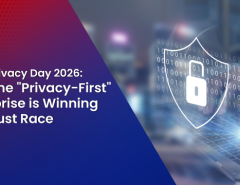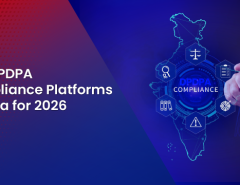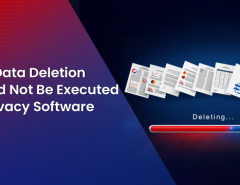Data privacy is a cornerstone of modern business operations and consumer trust in an increasingly digital world. Every click, transaction, or interaction in the online space generates data, often containing sensitive information. Protecting this data is a regulatory requirement and a moral obligation for businesses.
What is Data Privacy?
It refers to the protection and responsible handling of personal information, ensuring individuals have control over their data. It encompasses the practices and policies to safeguard sensitive information from unauthorized access, use, or disclosure.
It is the ability of a person to determine for themselves when, how, and to what extent personal information about them is shared with or communicated to others. It emphasizes individual control over personal data and the freedom to make informed choices about its use.
In a digital age where vast amounts of personal information are collected, data privacy is crucial in maintaining trust, securing identity, and preserving individual rights. Personally identifiable information (PII), such as names, addresses, phone numbers, and financial details, is at the core of data privacy concerns.
Key elements include:
Transparency: Organizations must clearly communicate how they collect, use, and store data.
Consent: Individuals must give explicit permission for their data to be used.
Compliance: Businesses must adhere to regulations such as DPDP, GDPR, CCPA, and HIPAA.
How is Data Privacy Achieved?
Achieving data privacy is a multifaceted process involving policies, technologies, and best practices. Here are some essential measures:
Privacy Notice and User Consent: It is fundamental to provide clear, transparent information about data collection practices and obtain explicit, informed consent from users.
Data Minimization: Collecting only the data necessary for specific purposes reduces risk exposure.
Access Control: Role-based access ensures that only authorized personnel can access sensitive data.
Compliance and Legal Frameworks: Adhering to data protection regulations like DPDPA, GDPR, CCPA, and other regional privacy laws that establish standards for responsible data handling and individual privacy rights.
Regular Audits: Periodic reviews of data practices help identify and rectify vulnerabilities.
Employee Training: Educating staff on the importance of data privacy and how to handle data securely minimizes human error.
Why is Data Privacy Important?
- Protects Individual Rights
Data privacy safeguards personal freedoms by ensuring individuals retain control over their information. In an age where data misuse can lead to identity theft, financial loss, or social engineering attacks, protecting this information is vital.
- Builds Consumer Trust
Consumers are more inclined to engage with businesses that emphasize data privacy. A commitment to protecting sensitive information fosters loyalty and improves brand reputation.
- Ensures Regulatory Compliance
Failing to comply with data privacy laws can result in significant fines and legal repercussions. Non-compliance can also lead to reputational damage that may be difficult to recover.
- Prevents Financial Loss
Data breaches are costly. The financial implications of inadequate data privacy measures can be devastating, from remediation expenses to business loss.
How Seqrite can Help Protect your Company’s Data Privacy
Seqrite Data Privacy is a comprehensive solution designed to help organizations discover, classify, and protect sensitive data across various enterprise resources. It ensures compliance with global privacy regulations such as GDPR, CCPA, and India’s DPDP Act.
It offers capabilities like automated data discovery, classification, labeling, and streamlined management of data subject rights requests through efficient workflows. By implementing Seqrite Data Privacy, businesses can enhance transparency, reduce operational complexities, and build customer trust by safeguarding personal information.
Here’s how Seqrite can support your data privacy goals:
ZTNA: Implementing a zero-trust model minimizes the risk of data breaches by verifying every user and device attempting to access sensitive data.
Data Loss Prevention (DLP): Seqrite’s DLP helps monitor and control data transfers to prevent the unauthorized sharing of sensitive information.
Endpoint Security: Comprehensive endpoint protection solutions defend against malware, ransomware, and phishing attacks.
Compliance Support: With tools designed to meet regulatory requirements, Seqrite simplifies complying with laws like DPDP, GDPR, and HIPAA.
By leveraging Seqrite’s advanced security solutions, businesses can build a strong foundation of trust, ensure compliance, and protect their most valuable asset: data.
Conclusion
Data privacy is not just a legal requirement but a fundamental aspect of building trust in today’s digital age. Organizations can safeguard sensitive information, foster customer loyalty, and achieve long-term success by understanding the what, how, and why of data privacy and leveraging advanced solutions like those offered by Seqrite.
Contact us or visit our website for more information on how Seqrite can help you achieve compliance.




